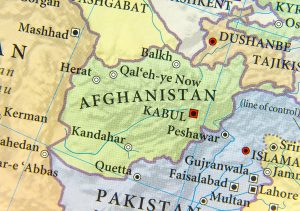On July 30-31, a U.S. delegation, led by U.S. Special Representative for Afghanistan Thomas West, met with Taliban representatives and “technocratic professionals” in Doha, Qatar.
Close watchers of Afghanistan noted the meeting, which appears to be the first official talks between the United States and the Taliban since August 2021.
Jonathan Schroden of the CNA Corporation remarked on Twitter (X): “The fact that the (seemingly) most substantive talks between the US & the #Taliban since the signing of the Doha deal in 2020 didn’t even register as a news item here makes clear where #Afghanistan stands on the US list of priorities these days.”
The U.S. State Department’s July 31 media note on the meeting provided some details of the discussion; what was left out is telling too.
For instance: Who attended these meetings?
West was joined in Doha by U.S. Special Envoy for Afghan Women, Girls, and Human Rights Rina Amiri and the chief of the U.S. Mission to Afghanistan, Karen Decker (the mission is presently still based in Doha). Presumably, other staff attended as well, but the U.S. readout highlights these three.
The composition of the Afghan delegation was not laid out with the same level of detail in the U.S. readout, with only “representatives of the Afghan Central Bank and Afghan Ministry of Finance” mentioned.
The Taliban delegation was led, however, by Foreign Minister Amir Khan Muttaqi — a detail confirmed by Taliban Ministry of Foreign Affairs spokesman Abdul Qahar Balkhi on Twitter. The Taliban delegation included the above-mentioned representatives of the Afghan central bank (Da Afghanistan Bank – AB) and the Ministry of Finance, as well as “officials from the Afghan Embassy & Political Office in Qatar.” Balkhi, in his tweet, said the Taliban delegation had met with “met with the US SR for Afghanistan Tom West & accompanying senior fifteen-member delegation from various departments.”
Now we have an idea of who attended the meeting, what did the two sides discuss?
Back to the U.S. readout: It starts with a mention of “areas for confidence building in support of the Afghan people” as well as an expression of “deep concern” about the humanitarian crisis in Afghanistan and the “need to continue to support aid organizations and UN bodies delivering assistance consistent with humanitarian principles.” This is followed by a paragraph focused on U.S. urging the Taliban to “reverse policies responsible for the deteriorating human rights situation in Afghanistan, particularly for women, girls, and vulnerable communities” as well as raising issues of “detentions, media crackdowns, and limits on religious practice.”
The readout then mentions discussions about the “state of the Afghan economy and the challenges that the banking sector faces” with the above-noted finance and banking officials; followed by a obligatory mention of “the Taliban’s continuing commitment to not allow the territory of Afghanistan to be used by anyone to threaten the United States and its allies…”
The U.S. readout closes with a noting of the Taliban poppy crackdown, but concerns about “processed opiates and synthetic drugs” and a positioning of counternarcotics as an avenue for continued dialogue.
On the other side, on Twitter Balkhi threaded what we can paste together and take as the Taliban’s readout of the meeting:
In the meeting, the two sides discussed confidence building, taking practical steps thereof, removing blacklists & lifting sanctions, unfreezing DAB reserves, economic stability of Afghanistan, countering narcotics… and issues on human rights.
[The Islamic Emirate of Afghanistan] reiterated that it was crucial for confidence building that blacklists & reward lists be removed, & bank reserves be unfrozen so that Afghans can establish an economy unreliant [sic] foreign aid.
Also, humanitarian aid, freedom of travel, & Afghans’ access to consular services around the world were among importance issues of discussion.
Removal of most of the restrictions on Afghan banks leading to easy transactions was considered a positive development.
Both sides emphasized the continuation of such meetings, understanding, & interactions.
The Taliban version leaves out the specific mention of women’s rights, an issue is prominently placed in the U.S. readout. Instead, the Taliban highlight economic facets, alongside specifics on what the Taliban see as “confidence building” measures: removal of Taliban members from blacklists and “reward lists.” For example, the Taliban’s interior minister, Sirajuddin Haqqani, is presently on the FBI’s Most Wanted Terrorists list with a reward of “up to $10 million” for information leading to his arrest.
It’s no surprise that the United States and the Taliban are on different pages, but it’s important nonetheless that there is dialogue between the two sides. For the Taliban, it’s clear their main interest is financial — Afghanistan’s economy is in a tremendously poor state, and Kabul wants access to the former Afghan Republic’s central bank funds, amounting to $7 billion in total frozen by the Federal Reserve Bank of New York in August 2021.
But in late July, Reuters reported that a “U.S.-funded audit of Afghanistan’s Taliban-run central bank has failed to win Washington’s backing for a return of bank assets from a $3.5 billion Swiss-based trust fund.” The trust fund was established last year with half of the frozen $7 billion, with the intent of eventually seeing the funds go back to Afghanistan. But, as a U.S. Treasury official told Reuters, first the Afghan central bank must show that it is free “from political influence and interference,” as well as prove that it has “adequate” controls against money-laundering and terrorism financing.
Treasury officials also want to see DAB install a “reputable” independent monitor. It’s a tall order. As an official told Reuters, “Our assessment of DAB remains unchanged.”
Its’s not clear from the U.S. readout, or the Taliban statements, if there were U.S. Treasury officials in the meeting — but that’s who the Taliban probably really want to talk to.
































